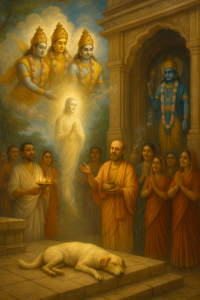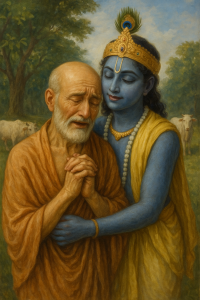A Life of Darkness Near the Temple
In a village nestled beside a sacred Viṣṇu temple, there lived a blind man named Andhaka. From birth, he had never seen the world, but he lived just a few houses away from the temple. Though unable to perceive light or the beauty of the Lord’s form, his life was shaped by the sounds that reached his ears—especially the ringing of the temple bell.
Every morning and evening, when the pūjārī performed the ārati of the Lord, the bell would ring melodiously, echoing through the air like a call from the divine. Andhaka would sit on his porch and fold his palms, offering pranāma each time he heard the bell, thinking, “The Lord is being worshiped. Let me also offer my humble obeisance.”
Faith Without Sight
Though he never once saw the deity, tulasī, or lamp, he believed with full faith: “That sound I hear is the sign of God’s presence.” He would often ask others what offerings were made to the Lord and what decorations adorned the altar that day. Hearing about the Lord gave him great inner joy.
He was poor and simple, and could offer nothing but his respect and heartfelt remembrance every time the bell rang. He never missed a single ārati in all his years.
The Last Bell and the Soul’s Reward
One evening, as the sun set and the temple lamps were lit, the bell rang out for ārati. Andhaka, sitting on his porch, smiled, raised his palms, and gently whispered, “Jaya Śrī Hari.” He then leaned back and quietly passed away.
As the townspeople discovered his body, something miraculous occurred—Viṣṇudūtas descended, illuminating the sky. They proclaimed:
“Though blind in this life, this soul had the vision of faith. Though he never saw the deity, he offered his heart each time he heard the Lord’s bell. The Lord accepts not the body, but the devotion of the heart. Come now, O soul of steady faith, enter the light of Vaikuṇṭha, where darkness never exists.”
And they carried him to the spiritual realm, where he could finally behold the eternal form of the Lord that he had long honored in sound.
Lessons to Be Learned:
- Faith does not depend on sight—the Lord sees the heart’s devotion, not the body’s condition.
- Responding to any sign of the Lord’s presence, such as the ringing of the bell or the sound of His name, purifies the soul.
- Even one who cannot physically serve can attain liberation by remembering and honoring the Lord sincerely.
- As confirmed in scripture: “yat karosi yad aśnāsi yaj juhosi dadāsi yat / yat tapasyasi kaunteya tat kuruṣva mad-arpaṇam”
“Whatever you do, whatever you eat, whatever you offer or give away, and whatever austerities you perform—do that as an offering unto Me.” (Bhagavad-gītā 9.27)
Origin of the Story: Padma Purāṇa – Stories section emphasizing the value of faith, remembrance, and heartfelt devotion even when physical senses are limited.


